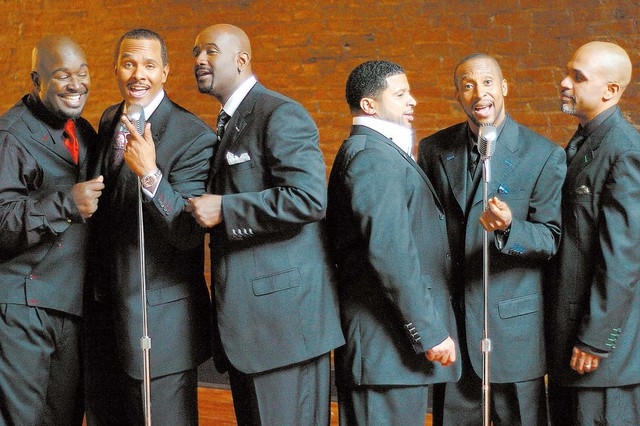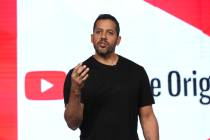More than a tribute, ‘Georgia on My Mind’ explores Ray Charles’ world



Some people called him “The Genius.” (The “only true genius in show business,” in the opinion of no less a personage than Frank Sinatra.)
Some people called him the “Father of Soul.” (Not to be confused with Godfather of Soul James Brown.)
But when it came time for the autobiography subtitled “Ray Charles’ Own Story,” Charles chose a more down-to-earth name befitting a singer who belonged in any and every musical family: “Brother Ray.”
Clearly, Ray Charles was — and is — a man for all musical seasons.
Which is exactly what Friday’s “Georgia on My Mind: Celebrating Ray Charles” is all about.
The latest “Jazz Roots” concert at The Smith Center’s Reynolds Hall, “Georgia on My Mind” not only salutes Charles’ impact on American music but explores what inspired it.
Clint Holmes, a regular at The Smith Center’s Cabaret Jazz, serves as both performer and “kind of the host,” he says, joining a lineup that includes 10-time Grammy-winning vocalists Take 6, jazz singer Nnenna Freelon and saxophonist Kirk Whalum.
Also on the bill: the Las Vegas Mass Choir (some of whom will step out to sing as Charles’ backup vocalists, the Raelettes) and a 17-piece UNLV jazz band that brings together current students, alumni and two instructors.
David Loeb, director of jazz studies at the University of Nevada, Las Vegas, serves as musical director for the evening, which he describes as a “greatest-hits concert” — one that ranges from Tin Pan Alley (Irving Berlin’s first hit, 1911’s “Alexander’s Ragtime Band”) to Broadway (“Oh, What a Beautiful Morning”).
And let’s not forget such trademark Charles tunes as “I Got a Woman,” “Hit the Road, Jack,” “I Can’t Stop Loving You” and “What’d I Say?”
In Loeb’s view, “the music is so fun,” in part because “it touches all ages and all ethnic groups. Every one of the songs means something to everyone.”
In addition to a musical cavalcade, the concert is “a semi-Broadway show,” according to “Jazz Roots” producer Larry Rosen. “It’s the story of Ray Charles, telling all the iconic moments in his life,” especially with host Holmes, who “kind of carries the storyline through.”
Holmes also sings a variety of songs, from pop to country to R&B, in both solo and collaborative numbers.
And while he might be singing Charles’ songs, Holmes isn’t imitating his inimitable voice or style.
“The challenge is that Ray was so uniquely himself,” Holmes says. “He didn’t sound like anyone else. And one of the keys for me was to find my own way through the tunes.”
After hearing Holmes rehearse the ballad “Come Live With Me,” Loeb reports that Holmes “pours his heart out in it.”
Heart — and soul — made Charles’ music unique, observes Take 6 founder Claude McKnight.
“He had a great way of bringing people into a song emotionally,” McKnight explains.
And whether he was bringing out the soul in country, or adding a gospel tinge to pop, Charles ranks as “one of the very few artists” who could make a song his own just by singing it.
Regardless of musical genre, when Charles sang something, “it became a Ray Charles song,” according to McKnight, who cited Charles’ rendition of “You Don’t Know Me” as a favorite example.
“When I heard that, I thought, ‘Wow — there’s no other version than this for me,’ ” McKnight recalls. (Alas, that’s one Charles song not on Friday’s playlist.)
“First and foremost, the songs that he chose are such great songs,” he says. “And to marry that with one of the soulful voices that ever graced the planet … ”
Overall, Charles’ “musical legacy is just incredible,” Loeb says, describing how Charles could “take American standards and morph them into an emotion, hitting on every word.”
On the piano, Charles also fused disparate styles, Loeb adds, explaining how he could punctuate “a great, luscious ballad” with some “New Orleans piano licks that bring it right on home. The juxtaposition is really Ray — he would just interject it, right at the right spot.” (But, as a jazz drummer who toured with Charles once told Loeb, members of his backing band had to “watch Ray’s foot when he sways from side to side,” which meant “you’d better be on the beat.”)
Rosen, who recorded a Ray Charles-B.B. King duet for his record label, describes Charles as “one of those people you can’t even define,” marveling at the level of talent he possessed. “No matter how he bends a note, no matter where he is rhythmically, everything is just perfect. And original.”
But for all its focus on Charles’ music, “Georgia on My Mind” has more on its mind: the times, and places, in which he created it.
Born into the Jim Crow South, Charles and other African-Americans faced “incredibly profound prejudice,” Loeb points out, referring to “some of the most embarrassing, horrible, ugly truths” in American history. “There’s a tendency to maybe push this stuff under the rug.”
Yet, ultimately, Charles survived and thrived in 20th-century America, eventually making his rendition of “America the Beautiful” the definitive interpretation, Rosen notes.
The tribute concert’s lineup also reflects “what American society’s all about,” he adds.
And that’s part of the appeal, according to Take 6’s McKnight.
“Typically, when you’re doing your own show on the road, you have to deal with all the pressures,” he explains.
But with “a collaborative effort, there’s a different energy that happens,” McKnight adds. “It’s a really cool thing, especially when you’re performing, to do and see other things you ordinarily wouldn’t do. It’s going to be a great time.”
Contact reporter Carol Cling at ccling@reviewjournal.com or 702-383-0272.
Preview
“Georgia on My Mind: Celebrating Ray Charles”
7:30 p.m. Friday
Reynolds Hall, The Smith Center for the Performing Arts, 361 Symphony Park Ave.
$29-$125 (702-749-2000, www.thesmithcenter.com)


















